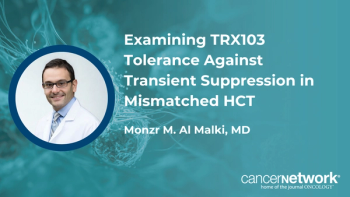
Elevating Psychosocial Care With the First-Ever World Psycho-Oncology Day
World Psycho-Oncology Day is an initiative aimed at spreading awareness and pursuing the further integration of psychosocial care into cancer treatment.
The International Psycho-Oncology Society (IPOS) announced that April 9, 2025, is the first-ever World Psycho-Oncology Day (WPOD), a day with the primary goal of spreading awareness of the importance of psychosocial care in oncology.
Following the announcement, CancerNetwork® interviewed Cristiane Decat Bergerot, PhD, MS, a psychologist, the head of supportive care at Grupo Oncoclinicas in Brazil, and a member of IPOS, who mentioned the focus on honoring Jimmie C. Holland, MD, a pioneer in the psycho-oncology space and the inaugural chief of the Psychiatry Services department at Memorial Sloan Kettering Cancer Center in 1977. At the time, this department was the first of its kind at any cancer center in the world.
The IPOS website officially lists 5 major goals of WPOD: raising awareness, honoring Jimmie Holland, engaging stakeholders, promoting action, and supporting fundraising efforts.
Transcript:
[WPOD] was created by the [IPOS] and its federation members to elevate global awareness of the psychological and emotional impact of cancer. It will be celebrated on April 9 starting in 2025, in honor of Jimmie Holland, MD. Our primary goals will be to raise awareness of the role of psycho-oncology in cancer care, to honor Jimmie Holland, to engage stakeholders, to promote psycho-oncology, and to promote actions for the integration of psychosocial care into national and global cancer guidelines. We also aim to support fundraising efforts to advance psycho-oncology initiatives. We aim to empower patients, caregivers, and health care professionals, fostering a future where psychosocial support is an integral part of oncology worldwide.
Jimmie Holland was a pioneer who transformed cancer care by bringing attention to the psychological and emotional challenges [that] patients [have]. She founded the field of psycho-oncology, demonstrating that mental health is an integral part of cancer treatment. Her groundbreaking research led to the development of distress screening guidelines, which are now a standard part of cancer care. Beyond research, Holland was a tireless advocate for integrating psychosocial care into cancer treatment globally. Through her leadership at [IPOS], she helped establish psycho-oncology as a recognized discipline, influencing policies and training programs worldwide. Her legacy continues to shape how we care for our patients today, ensuring that emotional and psychological well-being are prioritized alongside physical health. [WPOD] is a tribute to her contributions, celebrating her vision and reinforcing the importance of holistic cancer care.
Reference
World Psycho-Oncology Day (WPOD). IPOS. Accessed April 2, 2025. https://tinyurl.com/43c9rr2c
Newsletter
Stay up to date on recent advances in the multidisciplinary approach to cancer.










































